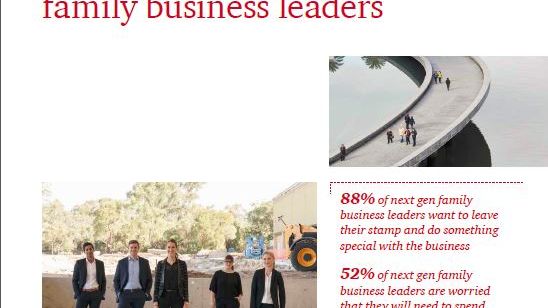
Press release -
Lack of strategic planning will hold family businesses back from growth, PwC
| Date | 2 November 2016 |
Contact | Natalie Choo Tel: +65 6236 4309 Mobile: +65 9738 1415 E-mail: natalie.yl.choo@sg.pwc.com Candy Li Tel: +65 6236 7429 Mobile: +65 8613 8820 E-mail: candy.yt.li@sg.pwc.com |
- Slow or no progress on strategic planning could impact growth
- Not all family businesses in Singapore are strategically ready for the digital age
- Gap in the alignment of family and business goals
Singapore, 2 November 2016 – Market conditions are taking a toll on family businesses in Singapore with sales growth down a third (from 72% in 2014 to 47% in 2016), according to a new report by PwC. At the same time, family businesses in Singapore saw sales reduction go up from 21% in 2014 to 33% in 2016.
Family businesses in Asia Pacific are the most ambitious, with 21% (15% globally) looking for the quickest and most aggressive growth according to findings from PwC’s biennial global survey of family businesses: The ‘Missing Middle’: Bridging the strategy gap in family firms. In Singapore, family businesses are less optimistic about quick and aggressive growth (15%) with the majority of respondents (62%) predicting steady growth and 5% reflecting that the business will shrink over the next five years.
The report warns that family businesses’ growth outlook could be further curtailed by the organisation’s own lack of strategic planning rather than economic factors or other external concerns. In fact, many issues now facing family business come back to a lack of strategic planning – the ‘missing middle’ – namely having a strategic plan that links where the business is at now to the long-term. This results in many families not being able to turn early promise into sustainable success.
While some family firms are managing strategic planning well, many are caught between the deluge of every day issues and the weight of inter-generational expectations. PwC found that areas such as digital and innovation, conflict management and succession are not being tackled effectively.
Although digital technologies play an increasingly important role in business, less than half (47%) of family businesses in Singapore have a strategy fit for the digital age and only one in 10 respondents (12%) indicated that being more innovative was very important.
Ng Siew Quan, Asia Pacific Entrepreneurial & Private Clients leader, PwC Singapore, comments:
“Innovation is not a priority as many businesses think of innovation from a perspective of disruptive innovation which is difficult to implement and execute. Instead of placing emphasis on disruptive innovation, family businesses could focus on progressive innovation which suggests incremental improvements to the business.
“Progressive innovation can be adopted through the introduction of new methods, being the first to carry out an idea (such as in the case of Intellectual Property), and to implement a corporate culture that drives value creation.”
When it comes family business success, both family and business should come together harmoniously. However, the findings show that respondents in Singapore do not have procedures to manage conflict within the family. In Singapore, 57% have at least one mechanism to deal with family conflict, far below the global average of 82%. Family business must implement conflict management mechanisms to provide a forum where conflicts can be objectively addressed and resolved for business growth and continuity.
In planning for succession, only 12% of respondents in Singapore have a succession plan for all senior executives and a startling 45% have no succession plan in place. 20% of respondents in Singapore indicated that they have incapacity and death arrangements, half that of family businesses globally (40%).
In Singapore, there is an increased desire to have ownership remain within the family while professional management is brought in to handle the day to day operations (30% will pass on management; 37% will pass on ownership). The availability of options to pursue their ambitions outside the family business may be a reason, amongst others, as to why family owners are not passing on both management and ownership fully to the next generation.
Ng Siew Quan, Asia Pacific Entrepreneurial & Private Client leader, PwC Singapore concludes:
“This year’s results on succession show a recurring theme. There’s no point having detailed plans for business continuity, if the single most significant risk to this is not addressed. A managed succession process can be a rallying point for the family, allowing it to reinvent itself in response to changing circumstances, but without a plan it is the most obvious ‘failure factor’ for the family business. Succession planning is a process, not an event.
“Although only half of the respondents have the next generation working in the business, their role is integral for the future of the family business. Majority of family businesses don’t believe they are vulnerable to digital disruption nor have a strategy fit for a digital world. In our experience they underestimate the impact of digitisation. The next generation will be the change agents for digital transformation.”
ENDS
Notes to editor:
For a full report, go to www.pwc.com/fambizsurvey2016
- PwC interviewed over 2800 family businesses in 50 countries between May and August 2016, with turnovers ranging from US$5 mil to over US$1billion. The total turnover of all those companies interviewed was more than $500bn. A third of interviewees came from 3rd/4th+ generation businesses. 60 respondents were from Singapore.
- According to the survey respondents, businesses from the Middle East and Western Europe are the most diversified.
- Following the 23 June referendum in the UK on leaving the European Union, questions about the potential impact of Brexit on their businesses were added to the questionnaire; 1,145 respondents answered these questions.
Related links
Topics
Categories
About PwC
At PwC, our purpose is to build trust in society and solve important problems. We’re a network of firms in 157 countries with more than 223,000 people who are committed to delivering quality in assurance, advisory and tax services. Find out more and tell us what matters to you by visiting us at www.pwc.com.
PwC refers to the PwC network and/or one or more of its member firms, each of which is a separate legal entity. Please see www.pwc.com/structure for further details.
© 2016 PwC. All rights reserved




